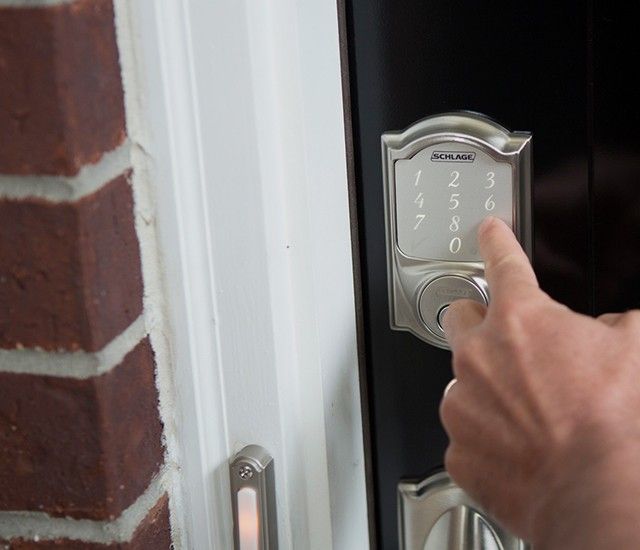At Northeast Security Solutions, we like to think of ourselves as a complete “on stop security stop.” We offer the entire gamut of security products, from technology-based electronics to the simplest of mechanical security products. In fact, we surprise many of our customers when we tell them that we started business as a locksmith shop! Although we’ve grown and evolved since then, we still routinely work in this important security field. After all, locks provide a first line of defense against burglars looking to breach your home. In this post, we share how we create next-level lock security for our home-owning customers.
First, we’ll review some of the common issues we see with residential locks. This will create a nice table-setter for the solutions to these issues that we will introduce. Then, we’ll explain how to identify cheap locks, and which locks to choose instead. From there, we’ll show you how key control systems work, and why we use them. Finally, we’ll focus on keypad lock security that helps you win the key-control battle by providing key-free access to your home. Now, let’s dive in with a look at why residential locks fail so often to begin with.
The Problems with Residential Locks
When we work on residential locks for our customers, we often run into security issues unique to homes. If you’ve reviewed our post on Commercial Door Hardware Options, you will remember that we have to follow specific codes and procedures that help ensure the safety and security of the products we install. However, residential applications have no such guidelines for proper product selection or installation techniques. This can lead to issues in lock performance and security.
Moreover, residential locks do not have the same durability as their commercial counterparts. Manufacturers design commercial locks for frequent, daily use. Therefore, these locks generally last for several years, all while maintaining their appearance and security. As such, business owners expect to pay some money for these locks, with the expectation of receiving a quality product.

It surprises many customers to learn that locks are “graded” to show customers their strength and durability.
On the other hand, residential customers often choose locks strictly with cost in mind. Right of the box, these locks already offer very little security. On top of that, add in the potential for poor DIY installation and a product that will quickly deteriorate, and you can see how locks installed in homes can fail quickly. In the next section, we’ll show you how paying attention to the “grade” of lock you select can help you create next-level home lock security.
Grading Your Locks’ Performance
All of us have heard the old adage that “you get what you pay for.” This sentiment runs especially true in the security industry. Many customers express surprise at how much the quality of lock hardware varies. In fact, lock hardware quality varies so much that the industry uses a three-point grading system designed by the American National Standards Institute (ANSI) and Builders Hardware Manufacturers Association (BHMA) to measure a lock’s quality!
Lock manufacturers often seek out ANSI/BHMA certification for their product lines. This certification involves putting locks through tests meant to gauge factors such as bolt strength, security, the ability to withstand impact and force, and quality of finish, among others. Allegion, one of the biggest global providers of security products, provides this helpful guide to door hardware testing. The lowest-quality hardware receives a “Grade 3” designation, with the best scoring in at Grade 1. As you can probably guess, Grade 2 falls right in the middle. Grade 2 locks represent a step up from Grade 3, without having quite the quality of a Grade 1 lock.
Unfortunately, most residential locks fall under “Grade 3” quality standards. Burglars can easily pick these locks, or drill them to gain access to your property. Before purchasing locks, look at the packaging to see if you can determine what grade of lock you are buying. If you cannot find this information, assume that you are holding a Grade 3 lock. We recommend installing a lock that will last longer while providing more security. Now, let’s take a look at a couple ways to add key control to your home’s security features!
Taking Advantage of Key Control
Even the sturdiest Grade 1 locks do nothing to stop someone who has the proper key. Of course, sometimes keys end up in the wrong hands. For this reason, we recommend using a key control system to help limit and track key copies. The best key control systems create unique key security in a couple different ways. First, key control customers create a list of those authorized to receive a copy of a key. When customers stop in for a copy of a secure key, we have to match their ID to the location’s list of authorized key copiers. If the individual is not on the list, we cannot create a key for them.
Additionally, top-of-the-line key control also involves the use of patented keyways. When locksmiths set up an account with a select few top lock companies, such as Medeco, they receive the ability to receive proprietary locks that can only be opened with keys created by that locksmith. This adds superior key control, as Medeco customers cannot go to another locksmith to try to work around their location’s key copy list. The level of control and security these systems provide make them a popular way for our customers to add next-level home lock security. Let’s now turn our attention to another way to add key control-based door security.
Adding Keypad Locks to Your Residence
Keypad locks have steadily risen in popularity over the past several years. We recommend these locks for a couple reasons. For one, keypad locks can add convenience by allowing you to grant access to your home without the need to stop at home yourself. Simply provide a “user” code to the friend or worker who needs access to your home, and you can even choose to delete the code afterwards if you want to make sure that nobody comes back and uses that code to enter the home down the road! Furthermore, keypad locks can solve the problem of people making unwanted key copies. If you use codes, rather than keys, to grant access to your home, you can add and delete codes as needed without worrying about someone creating a key copy to use down the line.

A smart keypad deadbolt, such as this lock by Schlage, allows for both key-based entry and remote operation through a smart phone.
As an additional keypad lock option, we also install smart keypad locks. These locks have all of the features of regular keypad locks, with some additional technology-related features added on! For example, you can lock and unlock a smart lock using an app on your phone. This allows you to grant one-time access to your home without providing a key or a code. Additionally, smart keypad locks can send alerts to your phone. This lets you know who uses a code to unlock your door, and when. The extra security and convenience provided by this technology has made smart keypad locks one of the most popular residential locks we provide.
Experiencing Next-Level Home Lock Security
We hope that this post helps you experience next-level home lock security for your own property. Additionally, we encourage you to contact us with any questions the material here may create for you. We will happily answer any and all security-related queries you may have. Moreover, we also invite you to take advantage of our free site survey program. We provide complimentary security audits and equipment quotes to both new and existing customers alike. While on site, we can address any specific door and lock security concerns you may have. Furthermore, we can make suggestions of our own based on observations made during our visit.
Perhaps you have some decent lock security in place, but wish to beef it up based on some of the tips you’ve read here. Or, maybe reading this has made you realize you need a complete lock “makeover.” Either way, we are here to help! We’ve worked with hundreds of customers to create home lock systems that provide the security they need. Together, we can create complete door security to keep you, your valuables, and your family as safe and secure as possible!
